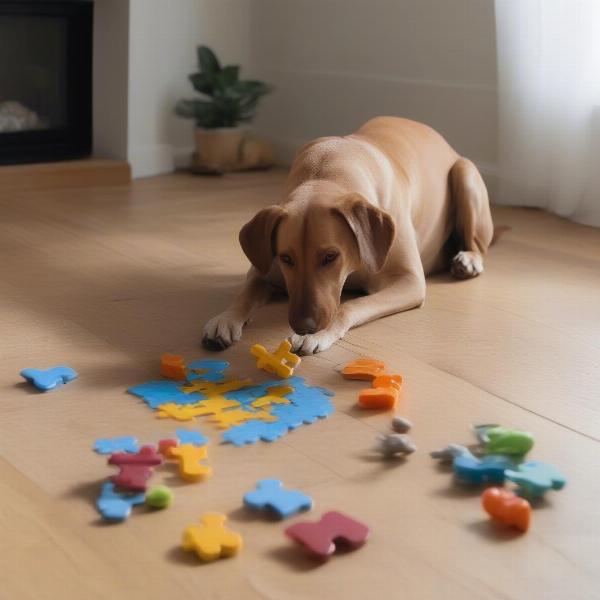When your furry friend starts gnawing on their leg, it can be concerning. Is it just a playful habit, or is something more serious going on? Understanding the reasons behind this behavior is the first step to helping your dog feel better. This article explores the various causes of leg gnawing in dogs, from simple boredom to underlying medical conditions, and offers practical solutions to address this issue.
Why Does My Dog Chew on Their Leg?
Several reasons can explain why a dog gnaws on its leg. Let’s delve into some of the most common causes:
Allergies
Allergies, whether environmental or food-related, can cause intense itching, leading to excessive licking and chewing. Common allergens include pollen, dust mites, certain foods (like beef, chicken, or dairy), and flea bites. If your dog’s leg gnawing is accompanied by other symptoms like skin redness, hair loss, or ear infections, allergies are a likely culprit.
Anxiety and Boredom
Dogs, like humans, can experience anxiety and boredom. When left alone for extended periods or lacking mental stimulation, they might resort to leg gnawing as a coping mechanism. This behavior can also be a sign of separation anxiety.
Parasites
Fleas, ticks, and mites can irritate your dog’s skin, causing them to chew and scratch relentlessly. Even if you don’t see any visible parasites, a vet can confirm their presence through a skin scraping or other diagnostic tests.
Dry Skin
Dry skin, often exacerbated by dry weather or nutritional deficiencies, can be intensely itchy. This can lead to increased licking and gnawing, especially on the legs which are easily accessible.
Pain or Injury
An underlying injury, such as a sprain, fracture, or even a foreign object lodged in the paw, can cause your dog to gnaw at the affected area. If your dog is limping, whining, or showing other signs of discomfort, consult a veterinarian immediately.
Infections
Bacterial or fungal skin infections can cause itching and discomfort, prompting your dog to gnaw on their leg. These infections can manifest as red, inflamed skin, often with a foul odor.
How to Stop a Dog from Gnawing on its Leg
Addressing this behavior involves identifying and treating the underlying cause. Here’s what you can do:
Veterinary Examination
The first step is to schedule a check-up with your veterinarian. They can diagnose the underlying cause and recommend appropriate treatment, whether it’s medication for allergies or parasites, pain management for injuries, or behavioral modification for anxiety.
Environmental Management
If allergies are suspected, try to minimize your dog’s exposure to potential allergens. Regularly clean your home, wash your dog’s bedding, and consider using an air purifier.
 Dog playing with interactive toys to alleviate boredom
Dog playing with interactive toys to alleviate boredom
Enrichment and Exercise
Provide plenty of physical exercise and mental stimulation to combat boredom and anxiety. Daily walks, playtime, and interactive toys can help keep your dog occupied and reduce their urge to gnaw on their leg.
Dietary Adjustments
If food allergies are suspected, your vet might recommend an elimination diet to pinpoint the culprit ingredient. Ensure your dog’s diet is balanced and provides all the necessary nutrients for healthy skin and coat.
Medications and Topical Treatments
Depending on the cause, your vet may prescribe medications to alleviate itching, treat infections, or manage anxiety. Topical treatments, such as medicated shampoos or sprays, can also provide relief.
Behavior Modification Techniques
For anxiety-related leg gnawing, behavior modification techniques, such as counter-conditioning and desensitization, can be effective. A certified dog trainer or veterinary behaviorist can guide you through these techniques.
Conclusion
Dog gnawing on leg can stem from various reasons, from simple dry skin to complex medical conditions. Addressing this behavior effectively requires identifying the underlying cause and implementing appropriate solutions. A visit to the veterinarian is crucial for accurate diagnosis and treatment. Providing a stimulating environment, a balanced diet, and consistent care will help your furry friend live a happier and healthier life, free from the discomfort of leg gnawing.
FAQ
- My dog only gnaws on one leg. Is this still a cause for concern? Yes, even if the gnawing is localized to one leg, it’s important to consult a vet to rule out any underlying medical issues.
- Can stress cause leg gnawing in dogs? Absolutely. Stress and anxiety can manifest in various ways, including excessive licking and chewing.
- How can I tell if my dog’s leg gnawing is due to allergies? Look for accompanying symptoms like redness, hair loss, or ear infections. A vet can perform allergy testing to confirm the diagnosis.
- Is it okay to use human anti-itch cream on my dog? No, never use human medications on your dog without consulting a veterinarian. Some human products can be toxic to dogs.
- What are some good interactive toys for dogs prone to boredom? Puzzle toys, treat-dispensing balls, and chew toys designed for mental stimulation can be excellent choices.
- How often should I bathe my dog if they have dry skin? Over-bathing can worsen dry skin. Consult your vet for recommendations on bathing frequency and appropriate shampoos.
- My dog is still gnawing their leg despite treatment. What should I do? Follow up with your veterinarian. They may need to adjust the treatment plan or explore other potential causes.
About ILM Dog
ILM Dog is your trusted international resource for all things dog-related. We provide expert advice on dog breeds, health, training, nutrition, grooming, and much more. Our comprehensive articles cover everything from choosing the right breed to managing complex health conditions, ensuring your canine companion receives the best possible care. For expert guidance on your dog’s specific needs, contact our team of experts at [email protected] or call us at +44 20-3965-8624. Visit ILM Dog today!